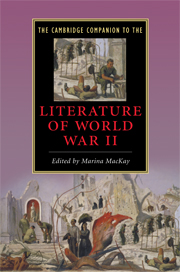15 - The war in contemporary fiction
from Part III - Approaches and revisions
Published online by Cambridge University Press: 28 May 2009
Summary
With very few exceptions, contemporary fiction dealing with World War II is produced by writers with no direct experience of the war. They do not remember it in any straightforward way but only know it at second or third hand through the memories, stories, and artifacts of earlier generations, and through popular war films, museum visits, pulp fiction, memoirs, TV documentaries, or history books. These sources may come to produce “prosthetic memories” for what is essentially a post-memorial generation. Contemporary war writing therefore reimagines war in an often self-conscious postmodern translation for an audience whose interests and agendas might differ significantly from those of the wartime generation but whose “prosthetic memories” shape individual politics and identities. Certainly, since the fall of communism and the end of the Cold War in the 1990s, the return of the war to the agenda of writers and historians as a lucrative and award-winning topic allows us to reassess its legacies. There is no doubt that the fight against Italian fascism, Japanese imperialism, and genocidal German Nazism was necessary, and that the world would be a very different place had these regimes not been destroyed. Yet in the light of continued postwar violence, new genocides, and new forms of imperialism, this moral certainty now seems strangely insufficient for the war to retain the cultural meanings it had previously. Not only have we become highly skeptical about our ability to heed moral imperatives and “learn from history,” but literary writers in particular are also suspicious of History itself - History as a discursive practice that turns the past into a readable narrative - while still committed to our responsibilities towards historical accuracy and moral accountability.
- Type
- Chapter
- Information
- The Cambridge Companion to the Literature of World War II , pp. 207 - 219Publisher: Cambridge University PressPrint publication year: 2009
- 2
- Cited by



